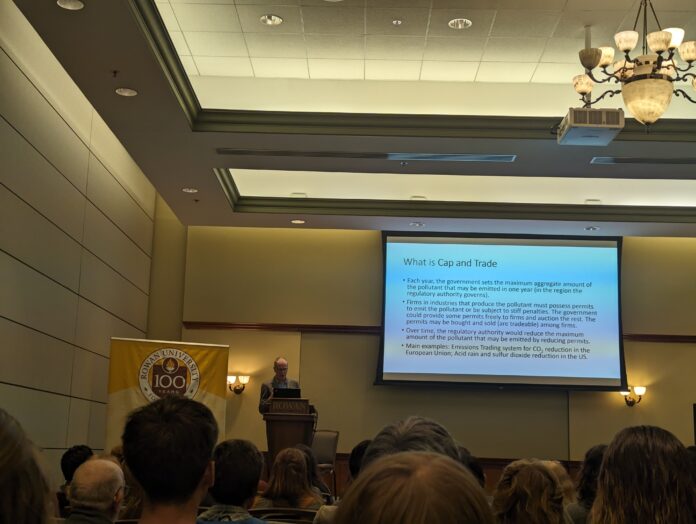
On Thursday, Oct. 19, from 7:00-8:15 p.m., Dr. David Tarr, an alma mater of the class of 65’ and former lead economist of the World Bank returns to Rowan University to give a presentation on the Centennial Lecture Series: “How to Save the Planet.”
“[David is] one of the most important alums who’s ever come through this University,” said William Carrigan, a professor in the History Department. “He received the distinguished alumnus award in 1998… He’s worked at a number of other places including the new economic school of Moscow, and he’s currently an academic and policy advisor in Tbilisi. He has worked in 13 of the 15 former Soviet countries. He’s published 80 refereed articles [and] 14 books.”
This event was co-sponsored by the Department of History, the Center for Interdisciplinary Studies, the Office of Alumni Engagement, the College of Humanities and Social Sciences, the Rohrer College of Business, and the School of Earth and Environment. Around 135 people attended the event.
Tarr structured his presentation around six important points.
He began his lecture with data about carbon dioxide emissions, beginning in the 18th century, and highlighting the emissions of multiple countries.
Next, he talked about how to conquer the free rider problem, which is when people benefit from a system they don’t pay for or contribute to. According to Tarr, tackling this problem is an important strategy for helping mitigate the effects of climate change.
The third and fourth points were on establishing independent climate watchdogs that can put limits on carbon emissions, and how it can be incorporated and compatible with the WTO (World Trade Organization).
Then he proposed subsidies meant to incentivize the use of transformative green energy.
The last point was on potential political agreement between democrats and republicans in the US on climate policy, and how they can work together to combat climate change.
One of the most important things Tarr talked about in his lecture was reciprocity, especially regarding the free rider problem.
“What reciprocity means is that my commitment depends on your commitment,” said Tarr. “So, if you commit, then I’ll commit. If I commit, then you’ll commit. But if I commit for more, then you commit for more… so without reciprocity, international agreements on climate change will result in a tragedy of commons.”
Tarr also talked about Elinor Ostrom, who won a Nobel prize in economic sciences, citing her fieldwork and studies on how small communities successfully shared natural resources for centuries. Those communities set rules that were economically and ecologically sustainable. They had reciprocal agreements that were tracked and enforced. If it was violated, then small penalties were given. From this research, Tarr wanted to address that by having regulations, it creates a responsibility to uphold reciprocity. Without it, there wouldn’t be any sense of urgency.
“Unilateral action applies no reciprocity and research shows that it won’t work,” said Tarr. “If you don’t believe in all that theory, then look at the Kyoto Protocol. Rich countries, including the U.S, took binding commitments and developing countries refused to take any.”
To keep that reciprocity, having a climate club is very important. Climate club was an idea proposed by nobel prize winner William Nordhaus. Tarr talks about his proposal and the countries that are charging carbon today.
“The idea of the climate club essentially starts as a coalition of [the] willing,” says Tarr. “The obvious members are those who are already pricing carbon, and even pricing higher than what was likely the minimum price that would be imposed by the members of the climate club. So that would include the European Union, most of Western Europe, Switzerland, and Norway. I believe they’re pricing carbon even higher than the European Union.”
Tarr emphasizes potential U.S. membership.
“I’m concerned about the United States. I think it’s important that the United States joins as well, but that would mean you would have to have a carbon price, and I think the United States [doesn’t] currently have [that],” said Tarr.
Elijah Huey, a sophomore majoring in history education, talks about his experience attending this event.
“I thought it was really cool that they got him here,” said Huey. “I think it was both cool and like, intimidating at the start when they talked about his career because it’s like he was the lead economist at the World Bank and [I’m] someone who’s just trying to be a high school teacher. It’s like, ‘damn, that’s crazy.’ But I think it’s good seeing how Rowan can help you reach your full potential and get you to a place where you’re actively affecting the world, so I think that was good. I think a lot of what he talked about was really cool”.
The next Centennial Lecture is on the Appalachian Spring, presented by The College of Performing Arts which will take place this Saturday, Oct. 28 at 7:30 p.m.
For comments/questions about this story DM us on Instagram @thewhitatrowan or email thewhit.newseditor@gmail.com.





